Did you get DNA matching the Scotland ethnicity region on Ancestry DNA? In this post, find out what it means to have Scottish DNA, how you inherited DNA from this region, and how to trace it.
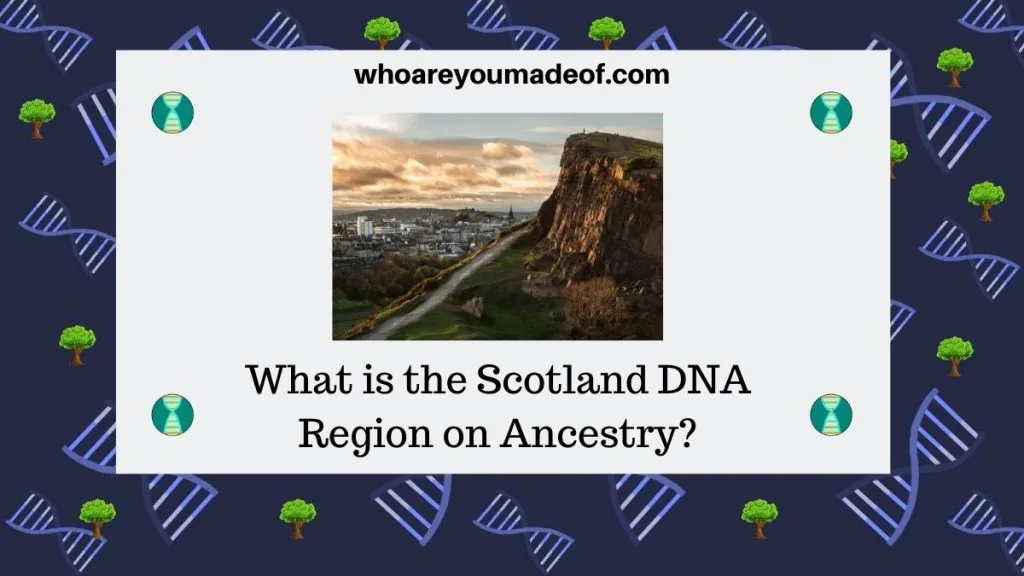
The addition of Scotland to the Ancestry DNA roster of ethnicity regions is very exciting. It's the first time that Scotland has been reported as a distinct region.
The Scotland DNA ancestral region was added several years ago as a part of an annual Ancestry DNA update. Our DNA results, including our ethnicity estimates, occasionally change due to improvements in science and technology.
If you tested with Ancestry DNA prior to 2020, you may have found Scotland included along with Ireland or Great Britain. This made sense, of course, because Scotland has an extensive cultural, linguistic, geographic, and even genetic links with these areas.
However, we love it when DNA results get more specific! Even though Scotland has a lot in common with neighboring countries, it has a unique genetic and cultural history that we want to explore.
Where is the Scotland DNA region located?
The Scotland DNA region on Ancestry is primarily located in the country of Scotland, which is approximate the northern third of Great Britain, the island. There are also many hundreds of small islands located off the coast of Scotland that are included in this region.
The image below shows the approximate location of the Scotland DNA region. DNA from the Scotland region can be found in many other parts of the world, however, which we will discuss in greater detail in the next section of this article.
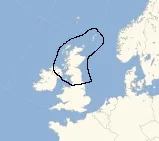
The center of the Scotland DNA ethnicity region ranges from just south of Newburgh, Fife Parish, and extends north to the Orkney Islands. People who have extensive ancestry in this area find, on average, to have more than 75% of their DNA matching the Scotland region.
The Scotland DNA region's outer points reach from it's southernmost point in Northern England north of Ripon, North Yorkshire, England. It's northernmost reach includes the Shetland Islands, which are located in the Northern Atlantic Ocean.
Some people are surprised to learn that the Scotland DNA region overlaps part of the island of Ireland. We can expect people who are native to parts of Northern Ireland to also show that a portion of their DNA matches the Scotland region.
No ancestors from Scotland, but got Scottish DNA?
Did you get DNA from the Scotland DNA region on Ancestry without having a known Scottish ancestor? There are a few reasons why this might have happened.
First, it's important to recognize that we don't know everything about all of our ancestors' ancestry. In other words, our ancestors who were from neighboring regions may have had Scottish roots.
I believe that this is why I show 7% of my DNA to have come from Scotland (see images below). According to Ancestry DNA, as little as 2% and as much as 16% of my DNA matches the Scotland region:
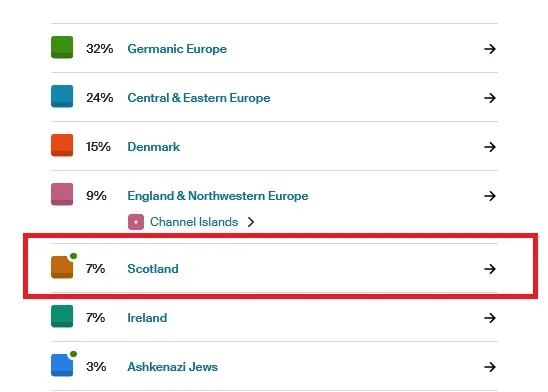
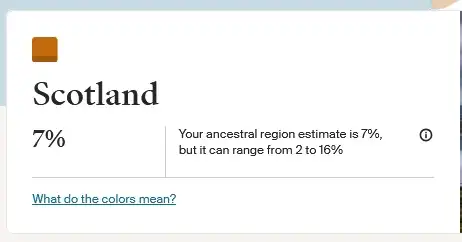
I have one great-great-great-great grandfather who was born in New Jersey in 1806 to Scottish parents. In other words, only one of my 64 4th great-grandparents was 100% Scottish.
This is not enough to explain my 7% Scotland DNA on my Ancestry results. In fact, if I inherited any of my DNA from my Scottish ancestor, which isn't a guarantee, it might only be about 1.5%.
However, some of my other ancestors, such as my Scots-Irish great-great grandfather, who I am descended from on another line of my tree, may have had DNA matching the Scotland region, and he might have passed some of that DNA down to me.
In other words, sometimes we must look at our family tree in its entirety in order to figure our which ancestor might have passed down a particular region to us.
How did you get your Scotland DNA?
At least between 28-40 million people around the world claim ancestry in Scotland. This is one of the largest diasporas from a single country in the world.
Scottish people left Scotland in many waves of emigration starting hundreds of years ago. Countries outside of the UK and Ireland with the largest numbers of members of the Scottish diaspora are:
- United States (over 5 million)
- Canada (over 4 million)
- Australia (over 1 million)
- Argentina (over 100,000)
- Chile (over 80,000)
It's important to note that the numbers of the members of the Scottish diaspora only include those who know, or feel pretty sure, that they have Scottish ancestry. There are likely many more people who have distant Scottish ancestry and would be surprised to learn of it.
Is it possible to trace Scotland DNA ancestry?
Whether you have 1% or 100% Scotland DNA on Ancestry, it can be possible to research your ancestors who came from this region. Generally speaking, the higher percentage of DNA from this region, the more ancestors you can find in your family tree who were from the Scotland DNA region.
If you would like to research your Scottish ancestry, the first step is to start building a family tree. If you haven't already started doing so, I would recommend building a family on Ancestry and taking the steps to connect your tree with your DNA results to get access to additional features on your DNA results.
If you have never built a family tree before, don't worry - it's not as hard as you think it might be. Beginning with your parents, you build back slowly generation by generation.
Learn more about building a family tree:
Those of us with Scottish ancestry who find ourselves living in English-speaking parts of the world have the added advantage of being able to explore genealogy records in Scotland in our native language. This is a big benefit, as language barriers can often hinder family tree research.
To learn more about genealogy research in Scotland, you might be interested in visiting the following page on the Familysearch.org site:
Conclusion
I hope that this post has helped you learn more about your DNA from the Scotland region, as well as how you can go about learning which ancestors were from this area.
If you have any questions about something that you read in this post, or if you would like to share your own experience discovering your Scottish DNA, I would love to hear from you in the discussion below.
Thanks for stopping by today!

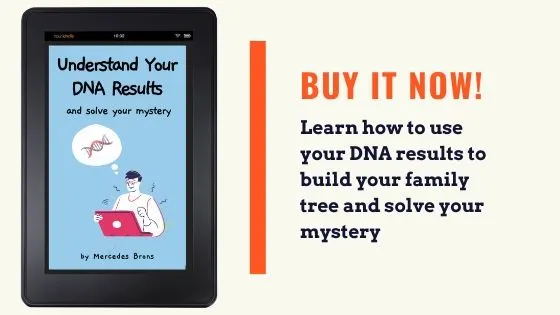
Cheryl Fletcher
Thursday 6th of February 2025
Yes my grandfather was of Scots descent and my grandmother on the other side was northern IrishScots
But I got back 48 percent Irish no Scots .
Why?
Carol Schroeder
Saturday 10th of September 2022
Very helpful , great grandfather cane from England but my DNA came up Scottish ! Your article gave a good explanation , my family was from Yorkshire so northern England .
Jerry Flippin, Jr.
Sunday 21st of August 2022
I'm Black and I have DNA from Scotland and England & Northwestern Europe. Possibly due to the slave trade, because I have DNA in the Virginia also. I'm probably right about this correct. Thank you.
Evie Hanlon
Tuesday 9th of August 2022
Scotch is whiskey. Scottish is people are Scots or Scottish.. The only times they are Scotch are if they are cranky.
Evie Hanlon
Tuesday 9th of August 2022
@Evie Hanlon, Excuse my second sentence. It should have read Scottish people are either Scots or Scottish. You made me quite Scotty.
Philip Grenyer
Saturday 12th of March 2022
Do you not realise that the north of England is not Scottish , there are as many people living there as there are in Scotland, its ridiculous. my results said I have 54% Scottish DNA , I live in Northumberland , I have my family tree going back 300 years with only two surnames that are Scottish, its so wrong it makes me angry,